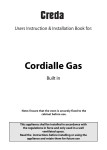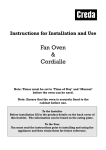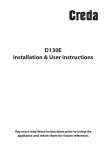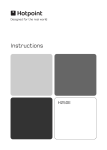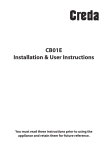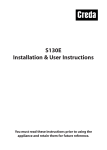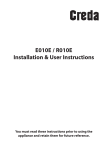Download Creda Cordialle S120G Technical data
Transcript
Cordialle S120G Use and Installation Instructions Note: Ensure that the oven is securely fixed to the cabinet before use. This appliance shall be installed in accordance with the regulations in force and only used in a well ventilated space. Read the instructions before installing or using the appliance and retain them for future use For more information on our exciting product range ring Creda Answer Centre 08701 54 64 74 OR Visit us on the NET at http://www.creda.co.uk Our site invites you to make use of our interactive cookbook and product selector. Feel free to browse our product range to see what’s bubbling away at the moment or to ask for help on our products and services Merloni Elettrodomestici UK Ltd. Morley Way Peterborough PE2 9JB Creda Answer Centre 08701 54 64 74 Web http://www.creda.co.uk It may be necessary from time to time to change the specification outlined in this booklet without notice. Any change which is made will not affect your statutory rights. 2 CONTENTS Introduction For Your Safety – Always For Your Safety – Never Clock/Minute Minder Operation Using The Grill Using the Oven Oven Cooking Charts Care and Cleaning Installation Something Wrong? Key Contacts 4 5 6 7-8 9 10-12 13-14 15-17 18-24 25 Back Cover DISPOSAL OF YOUR PRODUCT To minimise the risk of injury to children please dispose of your product carefully and safely. Remove all doors and lids (where fitted). Remove the mains cable (where fitted) by cutting off flush with the appliance and always ensure that no plug is left in a condition where it could be connected to the electricity supply. To help the environment, Local Authority instructions should be followed for the disposal of your product. 3 INTRODUCTION Your new cooker is guaranteed* and will give lasting service. This guarantee is only applicable if the appliance has been installed in accordance with the installation instructions detailed in this booklet. To help make best use of your cooking equipment, please read this booklet carefully. The cooker is designed specifically for domestic use and responsibility will not be accepted for use in any other installation. When first using the cooker ensure that the room is well ventilated (e.g. open a window or use an extractor fan) and that persons who may be sensitive to the odour avoid any fumes. It is suggested that any pets be removed from the room until the smell has ceased. This odour is due to any temporary finish and also any moisture absorbed by the insulation. * The guarantee is subject to the provisions that the appliance: (a) (b) (c) (d) Has been used solely in accordance with the Users Instruction Book. Has been properly connected to a suitable supply voltage and gas supply as stated on the Data badge attached to this equipment. Has not been subjected to misuse or accident or has not been modified or repaired by any person other than the authorised employee or agent. Has been correctly installed. This appliance conforms to the following EEC Directives: Low Voltage Equipment Gas Appliances 73/23/EEC 90/396/EEC 93/68/EEC Electromagnetic Compatibility 89/336/EEC 92/31/EEC 93/68/EEC 4 FOR YOUR SAFETY When used properly, your appliance is completely safe but as with any product there are certain precautions that must be observed. PLEASE READ THE PRECAUTIONS BELOW BEFORE USING YOUR APPLIANCE. ALWAYS ● Always make sure you remove all packaging and literature from inside the oven and grill compartments before switching on for the first time. ● Always make sure you understand the controls prior to using the appliance. ● Always keep children away from the appliance when in use as the surfaces will get extremely hot during and after cooking. ● Always make sure all controls are turned off when you have finished cooking and when not in use. ● Always stand back when opening an oven door to allow any build up of steam or heat to disperse. ● Always use dry, good quality oven gloves when removing items from the oven/grill. ● Always take care to avoid heat/steam burns when operating the controls. ● Always turn off the electricity supply at the wall switch before cleaning and allow the appliance to cool. ● Always make sure the shelves are in the correct position before switching on the oven. ● Always keep the oven and grill doors closed when the appliance is not in use. ● Always take care when removing utensils from the grill when the oven is in use as the contents may be hot. ● Always keep the appliance clean as a build up of grease or fat from cooking can cause a fire. ● Always follow the basic principles of food handling and hygiene to prevent the possibility of bacterial growth. ● Always keep ventilation slots clear of obstructions. ● Always refer servicing to a CORGI registered service engineer. 5 FOR YOUR SAFETY NEVER ● Never leave children unsupervised where a cooking appliance is installed as all cooking surfaces will be hot during and after use. ● Never allow anyone to sit or stand on any part of the appliance. ● Never store items above the appliance that children may attempt to reach. ● Never remove the oven shelves whilst the oven is hot. ● Never heat up unopened food containers as pressure can build up causing the container to burst. ● Never store chemicals, food stuffs or pressurised containers in or on the appliance, or in cabinets immediately above or next to the appliance. ● Never use the appliance as a room heater. ● Never use the grill to warm plates. ● Never dry any items on the oven doors. ● Never allow children to play with the controls. NOTE: The use of a gas cooking appliance results in the production of heat and moisture in the room in which it is installed. Always Ensure that the kitchen is well ventilated; keep natural ventilation holes open or install a mechanical ventilation device (mechanical extractor hood). In particular, when using the grill or more than one hotplate burner, open a window if a mechanical ventilation device is not operating. 6 CLOCK/MINUTE MINDER OPERATION 0.00 - CLOCKFACE The timer incorporates a 24 hour clock. + SYMBOLS 0.00 A ‘Bell’ symbol will light up when you select a Minute Minder Period and will remain lit for the period set. At the end of the Minute Minder Period, the timer will emit an audible tone and the ‘Bell’ symbol will disappear. Minute Minder SETTING THE TIME OF DAY 0.00 0.00 Step 1 Make sure all oven controls are turned off. Step 2 Check the electricity supply to the cooker is turned on. Step 3 When switched on, the display will show 0.00 Step 4 Press and release both buttons simultaneously. Step 5 Press the ‘+’ button to set the Time of Day. The Time of Day can be adjusted, by using the ‘+’ button to increase the time setting or the ‘-’ button to decrease the time setting. The Time of Day is set if no adjustments are made within 10 seconds. THE TIME OF DAY IS NOW SET. To change the time of day repeat Steps 4 & 5 above. 7 CLOCK/MINUTE MINDER OPERATION Here you can set a time period of up to 10 hours, that will count down. When it reaches zero, the timer will emit an audible tone. For Example: If you set 20 minutes, the audible tone will occur 20 minutes later. SETTING THE MINUTE MINDER Step 1 Ensure the time of day is set correctly. Step 2 Press and release the ‘+’ button. 0.00 Note: Step 3 must be started within 10 seconds, otherwise you must repeat Step 2. Step 3 Press the ‘+’ button to set the required time period. A ‘Bell’ symbol will light up. The time period can be adjusted, by using the ‘+’ button to increase the time period or the ‘-’ button to decrease the time period. Release all buttons, the timer display will show the remaining time period. The ‘Bell’ symbol will remain lit to signify that a time period has been set. 0.00 At the end of the set time an audible tone will be heard and the ‘Bell’ symbol will disappear. Step 4 To cancel the audible tone press the ‘+’ button. To cancel the minute minder period press the ‘-’ button until 0.00 is displayed in the window then press the ‘+’ button. If at any time the display shows flashing zero’s, it is likely that the electricity supply has been interrupted. Reset the timer to the correct time of day. Note: The Timer display will show the minute minder period as follows: 8 19.50 Any period up to 99 minutes and 50 seconds The display shows MINUTES and SECONDS (10s intervals) eg. 19 minutes 50 seconds 1.41 Any period between 100 minutes (1 hour 40 minutes) and up to 10 hours The display shows HOURS and MINUTES eg. 1 hour 41 minutes USING THE GRILL CAUTION - Step 1 Step 2 Step 3 Step 4 Step 5 ACCESSIBLE PARTS MAY BECOME HOT WHEN THE GRILL IS USED. YOUNG CHILDREN SHOULD BE KEPT AWAY. Open the grill door and remove the grill pan. Push in and turn the control knob anti- clockwise to the large flame symbol. Sparking will continue until the grill burner is lit. Slide the grill pan along the shelf towards the rear of the compartment until it stops. Turn the control knob anti-clockwise to the desired setting. Only turn the control between the large and the small flame symbols. To turn off, turn the control knob fully clockwise to the symbol O. Note: DO NOT line the grill pan with aluminium foil, as this increases the amount of fat spitting and can cause a fire. The grill burner will only operate when the door is open. If the grill door is closed while the grill is on, the grill burner will be shut off. When the door opened again the grill burner will turn on and be reignited. Grilling can be started from cold but for best results preheat for approximately two minutes. Most cooking is done with the heat on full, but it may be desirable to reduce it for thicker pieces of meat or for keeping food warm. For au gratin dishes e.g. macaroni cheese and meringue toppings e.g. baked alaska, place the dish on the floor of the grill compartment. The base of the grill pan can be used for warming fruit garnishes on the reduced setting. COOLING FAN A gentle flow of air will be blown below the control panel when any control is used. Whenever the appliance has been used, the cooling fan may continue to run or restart itself after all the controls have been turned off. 9 USING THE OVEN Note: DO NOT allow young children near to the appliance when the oven is in use as the surfaces get hot The oven has different heat zones - the temperature control settings refer to the temperature on the middle shelf; above this shelf it is hotter and below it is cooler. SHELF POSITIONING The two shelves can be used in four different positions. Each shelf has a safety stop to prevent it being pulled out too far when attending to food. Shelves are removed from the oven by pulling them out to the stop and the lifting at the front to withdraw. OVEN UTENSILS The baking dish and the grill pan without the handle can be used in the oven. To ensure good air circulation in the oven, the maximum size of baking tray that should be used is 300mm X 350mm (12" X 14"). OVEN OPERATION 1. 2. 3. Place the shelves in the correct position. ( see cooking chart ). With the oven door closed, push in and turn the control knob fully anti - clockwise. Sparking will continue until the burner is lit. Turn the control knob clockwise to the required setting ( see cooking chart ). There is a delay of about one minute whilst the safety device operates before the burner comes fully on. To turn off, turn the control knob fully clockwise to the symbol O. Note: The oven burner only operates when the oven door is closed. The oven burner will shut off when the door is opened, and will turn on and reignite when the door is closed again. COOLING FAN A gentle flow of air will be blown below the control panel when any control is used. Whenever the appliance has been used, the cooling fan may continue to run or restart itself after all the controls have been turned off. 10 USING THE OVEN COLD START COOKING Anything requiring long slow cooking such as casseroles and rich fruit cakes can be put into a cold oven. Satisfactory results can also be obtained with creamed mixture, rich pastries or yeast mixtures, but for perfection we recommend preheating the oven for about 15 minutes at the gas mark you require for cooking. ROASTING OF LARGE POULTRY The maximum weight of poultry that can be accommodated is 11.5kg (25 lbs) of suitable shape. It is important to check that the bird DOES NOT overhang the burner at the back of the oven. STORAGE AND RE-HEATING OF FOOD It is vitally important to strictly adhere to the basic principles of food handling and hygiene to prevent the possibility of bacterial growth. 1. If food is to be frozen or not served immediately, cool it in a clean container as quickly as possible. 2. Completely thaw frozen food in the refrigerator before re-heating. 3. Re-heat food thoroughly and quickly either on the hotplate or in a hot oven, Mk. 6, and then serve immediately. 4. Only re-heat food once. ‘COOK CHILL’ DISHES These should always be placed in a pre-heated oven ideally on the first or second shelf position. Follow the packet instructions for cooking time. ALUMINIUM FOIL If using Aluminium Foil: 1. Remember that it is important to increase the cooking time by one third. 2. Never allow the foil to touch the sides of the oven. 3. Never cover the oven interior with foil. 4. Never cover the oven shelves with foil. 11 USING THE OVEN The ‘S’ setting on the oven thermostat is used for slow cooking, keeping food warm and warming plates for short periods. USING THE ‘S’ SETTING FOR SLOW COOKING 1. All dishes cooked by the ‘S’ setting should be cooked for a minimum 6 hours. They will ‘hold’ at this setting for a further hour but marked deterioration in appearance will be noticed in some cases. 2. Joints of meat and poultry should be cooked at Mk. 6 for 30 minutes before turning to the ‘S’ setting and never be cooked lower than the middle shelf position. 3. Joints of meat over 6 lbs (2.7kg) and poultry over 4 lbs 8oz (2 kg) should not be cooked using the ‘S’ setting. 4. Always stand covered joints on a rack over the meat tin to allow good air circulation. 5. A meat thermometer should be used when cooking pork joints and poultry. The internal temperature of the food should reach at least 88˚C. 6. This method is unsuitable for stuffed meat and stuffed poultry. 7. Always bring soups, casseroles and liquids to the boil before putting in the oven. 8. Cover casseroles with foil and then the lid to prevent loss of moisture. 9. Always thaw frozen food completely before cooking. 10. Root vegetables will cook better if cut into small pieces. 11. Adjust seasonings and thickenings at the end of the cooking time. 12. Use the zones of heat in the oven, e.g. meringues and milk puddings can be cooked lower in the oven whilst other dishes requiring greater heat can be cooked above them. 13. Egg and fish dishes need only 1-5 hours cooking and should be included in day cooking sessions, when they can be observed from time to time. 14. Dried red kidney beans must be boiled for a minimum of ten minutes after soaking, before inclusion in any dish. 12 OVEN COOKING CHART The following times and setting are for guidance only. When a different setting to that shown below is given in a recipe, the recipe instructions should be followed. Allow 15 minutes preheat for best results. Shelf position 1 is the highest. Food Gas Mark Shelf Positions 5 2 5 4 25 - 30 mins per 450g (1lb) + 25 mins Approx. Cooking Time and Comments FISH Oily and White fish 20 - 30 mins, depending on recipe MEAT AND POULTRY Beef Ham 5 4 40 mins per 450g (1lb) covered in foil plus 40 mins extra uncovered Lamb 5 4 30 mins per 450g (1lb) + 30 mins Pork 5 4 40 mins per 450g (1lb) + 40 mins Chicken 5 4 25 mins per 450g (1lb) + 25 mins Duckling & Goose 5 4 25 mins per 450g (1lb) + 25 mins Turkey 4 4 15 - 20 mins per 450g (1lb) + 20 mins Casseroles 3 4 2 - 6 hrs, depending on cut of meat 5 3 11/2 - 3 hrs until soft, depending on size Milk Puddings (500ml / 1pt) 3 3 13/4 - 2 hrs Baked Custard (500ml / 1pt) 3 3 40 - 50 mins in Bain-Marie Baked sponge puddings 4 3 35 - 50 mins Baked Apples 3 3 30 - 40 mins depending on size & type Meringue puddings 1 3 15 - 20 mins Apple Pie (1 x 205mm / 8") 6 2 50 - 60 mins Fruit crumbles 5 3 35 - 40 mins VEGETABLES Baked jacket potatoes PUDDINGS If using aluminium foil: 1. Remember it is important to increase the cooking time by one third. 2. Do not allow the foil to touch the sides of the oven. 3. Do not cover the oven interior with foil. 4. Do not cover the oven shelves with foil. 13 OVEN COOKING CHART The following times and settings are for guidance only. Allow 15 minutes preheat for best results. Shelf position 1 is the highest. Gas Mark Shelf Positions Small Cakes - 2 trays 5 1&3 15 - 25 mins. - 1 tray 5 2 15 - 25 mins. Victoria sandwich (2 x 205mm / 8") 4 1&3 30 - 40 mins. Swiss Roll 5 1 20 - 25 mins. Christmas cake 2 3 Time depending on recipe Madeira cake 4 3 11/4 - 11/2 hrs. Rich Fruit cake 2 3 Time depending on recipe Semi rich fruit cake 2 3 11/2 - 13/4 hrs. Scones 7 1&3 10 - 20 mins. Shortbread 2 2 50 - 70 mins Biscuits 4 1&3 Time depending on recipe Shortcrust Pastry 6 1&3 Time depending on recipe Rich Short Crust Pastry 6 1&3 15 - 25 mins. Flaky/Puff Pastry 6 2 25 - 35 mins. Choux Pastry 6 2 20 - 30 mins. Bread 7 3 25 - 40 mins Rolls 7 1&3 15 - 20 mins Chelsea Buns 5 2 25 - 30 mins - Large 7 2 30 - 40 mins - Individual 7 1 20 - 25 mins ‘S’ 4 21/2 - 4 hrs. Food Approx. Cooking Time and Comments CAKES, PASTRIES AND BISCUITS YEAST MIXTURES MISCELLANEOUS Yorkshire Pudding Meringues Soft Margarine – If soft tub margarine is used for cake making, use the oven settings recommended by the margarine manufacturer and not those indicated on the cooking chart. Temperature settings recommended in this chart refer to cakes made with block margarine or butter only. 14 CARE AND CLEANING Warning: Before cleaning, please ensure that the electricity supply to the appliance is switched off and the appliance is fully cold. 1. “CREDACLEAN” OVEN LINERS - OVEN ONLY (a) How "Credaclean" works. The surfaces of the "Credaclean" oven liners are treated with a special vitreous enamel which absorbs cooking soils. At temperatures of mark 7 or above, the special surface enables these soils to be slowly destroyed. The higher the temperature the more effective it is. (b) Cleaning. In most cases normal cooking operations at mark 7 will permit this cleaning operation to proceed during cooking. However if higher cooking temperatures are not used regularly, it may be necessary, in order to prevent heavy soiling, to run the ovens without shelves or meat pan, at mark 8 for about 2 hours hours. During this cleaning cycle, surfaces may become hotter than in normal use. Children should be kept away. It should not normally be necessary to clean the "Credaclean" panels with water. If the user feels it is desirable to do so, wipe them over with a clean, soapy cloth, followed by a wipe with a clean damp cloth. OVEN SIDE LINERS, REAR PANEL & ROOF LINER DO NOT use biological washing powder, harsh abrasives or chemical oven cleaners of any kind as this could damage the “Credaclean” oven liners. 2. CLEANING THE GRILL AND OVEN (a) Base, Sides & Rear of Grill and Base of Oven. GRILL PAN BASE, REAR & SIDES OVEN SHELVES OVEN BASE MEAT PAN Wipe out the oven with a damp soapy cloth. For more stubborn stains on the base of the oven use a well soaped fine steel wool soap pad. (b) Grill Pan, Meat Pans & Oven Shelves. To prevent stains from being burnt on to the grill pan, food support and rod shelf, always wash immediately after use in hot soapy water. Use a well soaped fine steel wool soap pad to remove stubborn stains from the rod shelves, grill pan, meat pan and the base of the oven. 15 CARE AND CLEANING 3. OVEN DOORS (a) Control Panel Regularly wipe with a clean, damp cloth and polish with a clean, dry cloth. CONTROL PANEL OVEN DOORS (b) Trims It is advisable to clean the trims regularly to prevent any build up of soiling which may detract from the appearance of the cooker. The recommended method of cleaning is to wipe over the trims with a clean, soft cloth wrung out in warm water, or mild non abrasive cleaner. (If in doubt try the cleaner on a small area of trim which is not notice able in normal use), then after wiping with a cloth wrung out in clear water, dry with a clean, soft cloth. (c) Inner Door Panels & Glass Open the door fully. The glass panel may now be washed. Stubborn stains can be removed by using a well soaped, fine steel wool soap pad. TRIMS DO NOT use scouring pads, or abrasive powder, which will scratch the glass. 4. REPLACEMENT OF THE OVEN LAMP Warning: To avoid an electric shock, ensure that the electricity supply to the appliance is switched off and the appliance is fully cold before removing lamp lens. Open the oven door and remove the oven shelves. Using a thick cloth, grip the lamp lens, unscrew anticlockwise and remove the lens. Carefully unscrew the bulb anti-clockwise. Fit replacement bulb (25W 300°C SES) and refit lens. OVEN LAMP 5. HOW TO CLEAN THE LAMP LENS Warning: To avoid an electric shock, ensure that the electricity supply to the appliance is switched off and the appliance is fully cold before cleaning lamp lens. Open the oven door and remove the oven shelves. Using a thick cloth, grip the lamp lens, unscrew anticlockwise and remove. Clean with a non-abrasive cleansing cream and refit lamp lens. OVEN LAMP 16 DO NOT use scouring pads, or abrasive powder, which will scratch the glass lens CARE AND CLEANING TO CLEAN THE INSIDE OF OUTER AND INNER GLASS PANELS Warning: Always switch your appliance OFF at the mains supply and allow to cool before cleaning. Fig. 1 1. Position oven door as shown in fig. 1. Note: The door can be wedged open using a towel between the door and the side trim thus leaving your hands free. Fig. 2 TWO SCREWS/ WASHERS DOOR FIXING TAG Fig. 3 RUBBER GROMMETS Fig. 4 DOOR INNER PANEL DOOR OUTER GLASS & HANDLE 2. Grip inner door panel and handle/outer glass assembly. Remove two screws and fibre washers (put to one side) as shown in fig. 2. 3. Pull handle/outer glass assembly at the top outwards while still holding the inner door panel and unhook handle/outer glass assembly at the bottom by lifting handle/outer glass assembly upwards as shown in fig. 3. Take care not to dislodge rubber grommets in bottom of door. 4. Return the inner door panel to the closed position as shown in fig. 4. Warning: Care must be taken when closing the door inner panel as the door will attempt to snatch shut without the weight of the handle/outer glass assembly. Avoid trapping your fingers. 5. The inside of inner and outer door glass can now be cleaned using a clean, damp cloth and polished using a clean, dry cloth. 6. Refit the handle/outer glass assembly by opening the oven door and hold taking care not to trap your fingers, see fig. 3. Hook the handle/outer glass assembly back into the rubber grommets at the bottom of the inner door panel, see fig. 3. Fit the handle/outer glass assembly back in position at the top ensuring the fixing tags on the handle/outer glass assembly fit inside the door inner panel. While still holding door together, refit the two screws and washers, see fig. 2. Never operate the ovens without the outer glass panels correctly refitted. 17 INSTALLATION INSTRUCTIONS Prior to installation, ensure that the local distribution conditions (nature of the gas and gas pressure) and the adjustment conditions are compatible. The adjustment conditions for this appliance are stated on the data badge which is fitted behind the bottom of the main oven door seal. This appliance is not designed to be connected to a combustion products evacuation device. It must be installed and connected in accordance with current installation regulations. particular attention should be given to the relevant requirements regarding ventilation. MODEL NUMBER: S120G Category I2H (GB. IE) These models are set to burn NATURAL GAS (G20) at 20 mbar ONLY and can not be used on any other gas. GAS SAFETY (INSTALLATION & USE) REGULATIONS It is the law that all gas appliances are installed by competent persons in accordance with the current edition of the above regulations. It is in your interest and that of safety to ensure compliance with the law. In the UK, CORGI registered installers work to safe standards of practice. The appliance must also be installed in accordance with BS 6172:. Failure to install the appliance correctly could invalidate the warranty liability claims and could lead to prosecution. LOCATION The appliance may be located in a kitchen, kitchen/diner or a bed-sitting room, but not in a room containing a bath or shower. The appliance must not be installed in a bed-sitting room of less than 20m3. PROVISION FOR VENTILATION The room containing the appliance should have an air supply in accordance with BS 5440: Part 2: The room must have an opening window or equivalent; some rooms may also require a permanent vent. If the room has a volume between 5 and 10m3, it will require an air vent of 50cm2 effective area unless it has a door which opens directly to outside. If the room has a volume of less than 5m3, it will require permanent air vent of 100cm2 effective area. If there are other fuel burning appliances in the same room, BS 5440: Part 2: should be consulted to determine air vent requirements. TECHNICAL DATA Gas connection Gas supply Pressure test point Electrical connection 18 Rp 1/2 (1/2" BSP female) G20 at 20 mbar. Grill injector Flexible cord fitted with a 3 pin 13 amp plug. 230 - 240 a.c. 50HZ 3A fuse BURNER HEAT INPUT INJECTOR Grill Oven 3.6 kW 2.4 kW 150 115 INSTALLATION INSTRUCTIONS 1. GENERAL The appliance is designed to be mounted on a floor between two adjacent cabinets. The cabinets should be securely fixed to the wall and the cooker securely fixed to the cabinets. This cooker must not be used free standing. This appliance must not be installed over any other appliance that generates heat such as a plinth heater. The appliance can be installed under a worktop with or without a hob unit above. It is important that the installation instructions for the hob are strictly observed. Where a hob is fitted above the oven unit the electrical connection for the hob should be made with an 85 C heat resisting flexible cord to table 15 of BS 6141. A gas hob fitted above the appliance should be connected to the gas supply with rigid tubing. If a hob is to be installed directly above the appliance it must not project downwards more than 20mm (30mm including a gas supply pipe where applicable) below the underside of the worktop. Any projection of more than 10mm below the worktop must not project more than 500mm from the wall. 0 2. FINAL INSTALLATION a. Ensure that the adjacent cabinets and the gap between them have dimensions in accordance with the diagram. b. Assemble the plastic plugs provided into the fixing brackets. (See diagram) c. Fix the fixing brackets to the sides of the adjacent cabinets so that the centre line of the brackets are 565mm above the top of the plinth line and the front face of the plastic plug is level with the front face of the cabinet sides. (See diagram) d. Adjust the feet on the cooker to their minimum position, ie. fully screwed in. e. Slide the cooker centrally into the space between the cabinets ensuring the following: i) The gap between the cabinet sides and the cooker is even along the length of the cabinet sides. ii) The cable is routed away from any vents in the rear panel and is not trapped between the cooker and the wall, adjacent cabinets or under the feet. f. Adjust the feet using an open ended spanner until the bottom of the cooker door is in line with the top of the plinth. Using a spirit level check that the cooker is level in all directions. g. Check that the plinth can be fitted. If necessary re-adjust the feet and check that the cooker is level. h. Open the top oven door and fix the cooker to the brackets through the holes in the side trims. i. Fix the plinth in position. j. Ensure that there is a minimum gap of 1mm between the cooker side trim and the adjacent cabinet doors or drawer fronts. 19 INSTALLATION 890mm Max 870mm Min 597mm min 720mm min 565mm n mi 570 565mm to top of plinth 150mm min 170mm max A minimum distance of 25mm should be maintained between the front face of the cabinet side and the front face of the plinth. 20 INSTALLATION Top View Wall Fixing Bracket 587mm including gas connection but excluding handle and knobs. 850mm min Cooker Cabinet Doors 70mm 815mm min 835mm min 568mm 550mm excluding Gas connection 597 mm Feet adjustable in height by 40mm. 21 INSTALLATION INSTRUCTIONS CONNECTING TO GAS SUPPLY The appliance is designed to be connected with an approved flexible connection to BS 669. A length of 1.25 to 1.55m is recommended. An adaptor backplate should be fitted in the area shown to allow the appliance to be pushed fully back into the space between the cabinets. The flexible hose should be fitted such that it does not pass through a space where it is likely to become trapped or damaged. The temperature rise of areas at the rear of the appliance that are likely to come into contact with the flexible hose do not exceed 70˚C. 140mm 500mm 640mm 460 mm Dimensions are with the feet adjusted to their minimum level. 22 ELECTRICAL CONNECTION WARNING – THIS APPLIANCE MUST BE EARTHED. CONNECT TO A 230-240V A.C. SUPPLY ONLY. Connection to the electricity supply should be made via a properly earthed, readily accessible wall socket which is adjacent to, and not more than 1.25m away from the appliance and capable of electrical isolation. The mains lead should be routed such that it cannot touch hot parts of the appliance i.e. the back panel above a height of 350mm from the bottom of the oven recess. If the oven is to be wired into a connector unit, this may be positioned behind the oven providing the following requirements are met: i) The connector unit must not project more than 25mm from the wall. ii) The top of the connector unit must not be more than 350mm above the base of the oven recess. NOTE: The removed plug cannot be used for any other appliance and should therefore be properly disposed of and not left where children might find it and plug it into a supply socket – with the obvious consequent danger. IF THE FITTED PLUG IS REMOVED The flexible mains lead must be correctly connected as below to a three pin plug of not less than 13 amp capacity. If a B.S. 1363 fused plug is used, it must be fitted with a 3 amp fuse which is approved to B.S. 1362. IMPORTANT: The wires in the mains lead fitted to this appliance are coloured in accordance with the following code: GREEN AND YELLOW BLUE BROWN – EARTH – NEUTRAL – LIVE Blue to Neutral Cord Clamp Green & Yellow to Earth Brown to Live 3 Amp Fuse As the colours of the wires in the mains lead of this appliance may not correspond with the coloured markings identifying the terminals in your plug, proceed as follows:– The wire which is coloured green and yellow must be connected to the terminal in the plug which is marked with the letter E or by the earth symbol or coloured green or green and yellow. The wire which is coloured blue must be connected to the terminal which is marked with the N or coloured black. The wire which is coloured brown must be connected to the terminal which is marked with the letter L or coloured red. When wiring the plug, ensure that all strands of wire are securely retained in each terminal. Do not forget to tighten the mains lead clamp on the plug. As the appliance must be earthed, do not use 2-pin sockets outlets, if you are in doubt, consult a qualified electrician. Should the mains lead ever require replacement, it is essential that this operation be carried out by a qualified electrician and should only be replaced with a flexible cord of the same size i.e. 0.75mm2 cross sectional area and temperature rating of 85˚C e.g. heat resisting PVC. IF A MOULDED PLUG IS FITTED In the event of replacing a fuse in the plug supplied a 3 amp ASTA approved fuse to BS1362 must be fitted. NOTE: The fuse cover must be refitted when changing the fuse. In the event of losing the fuse cover the plug must not be used until a replacement fuse cover has been obtained and fitted. A new fuse cover can be obtained from your local electrical retailer. The colour of the correct replacement fuse cover is that of the coloured marks or inserts in the base of the plug. 23 INSTALLATION INSTRUCTIONS INSTALLATION AND OPERATIONAL CHECKS After installation, check for gas soundness. The supply pressure can be checked at the grill injector. Loosen the fastening screw on the left hand side of the grill burner and slide the burner to the right and then off the injector. Ensure that the grill burner is correctly located and the fixing screw tightened on reassembly. 1. Check that the grill burner ignites correctly and burns with a steady flame. Check for a steady flame on the low setting. 2. Check that, with the main oven set to mark 9, the burner ignites at low rate, and then increases to full rate within 60 seconds. Leave the oven full on with the door closed for 10 minutes, and check that when the control is turned to the ‘S’ setting that the flame reduces. 3. Check the operation of the timer, oven light & cooling fan. Instruct the user on operation of the appliance. . 24 SOMETHING WRONG? Before calling a Service Engineer, please check through the following lists. THERE MAY BE NOTHING WRONG. Problem Check Nothing works. If the clock display is blank. Then it is likely that there is no electricity supply to your oven. Check: (i) That the main cooker wall switch is turned on. (ii) Check other appliances to see if you have a power cut. (iii) Check the main circuit breaker for the property. Draught from beneath control panel. A gentle flow of air will be blown from beneath the control panel when the appliance is used. If the appliance is still warm, this cooling fan may continue to run, or restart itself after all controls have been turned off. The fan will stop once the appliance has cooled. Cooling fan not operating If no air is blown from below the control panel when the controls are switched on and you have checked through the " Nothing works " section above, then the cooling fan may be faulty. In this case you should turn off the appliance and contact your service agent to arrange for a repair. Oven burner not working Note that the oven burners only operate when the door is closed to ensure safe operation and avoid wasting heat. With the door closed the oven burner will ignite. Oven appears to be cooking at too It may be necessary to turn to a lower setting than shown on the cooking high a temperature. chart or recipe as results depend on personal tastes. If the oven appears to be cooking at too high a temperature than previously, and turning down the thermostat has no effect, then the thermostat may be faulty and you should contact your service agent. If you have been through the above list and there is still a problem; contact our Service department (see Key Contacts, back page). 25 NOTES 26 NOTES 27 Key Contacts Service Creda has the largest appliance manufacturer’s service team in Europe, trained specialists directly employed by us to ensure your complete confidence. Repair Service UK: 08709 066 066 Republic of Ireland: 1850 302 200 You will be asked for the following information:Name, address and postcode. Telephone number Model / Serial number of the appliance Clear and concise details of the query or fault Place and Date of purchase (Please keep the receipt as evidence will be required when the engineer calls). Extended Warranty To join: UK 08709 088 088 Republic of Ireland: 1850 502 200 Genuine Parts & Accessories Mail Order Hotline UK: 08709 077 077 Republic of Ireland: (01) 842 6836 For further product information 08701 546474 All Creda Services are offered as an extra benefit and do not affect your statutory rights. Merloni Elettrodomestici UK Limited, Morley Way, Peterborough, PE2 9JB PRINTED BY SIMLEX . FOUR ASHES, WOLVERHAMPTON. September 2003 Part No. 4866200198-01




























